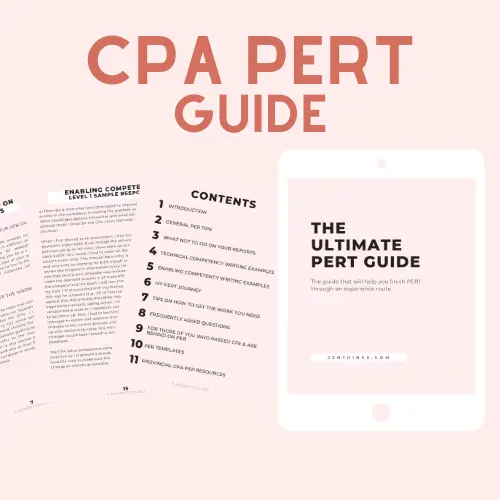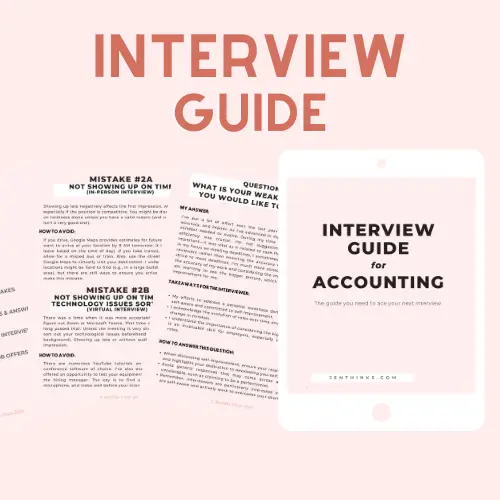If you follow me on Instagram, you would know that I have been meaning to learn Python for finance as an accountant. I started earlier this year but I put my plan on hold when I decided to focus on CFE prep without burning out. Like most CPA candidates who worked in the industry, I worked as an accountant full-time leading up to CFE with a couple of weeks off. It was important for me to balance work, CFE prep, jenthinks and life. Now that CFE is behind me and the only things left are waiting for my results and finishing PERT, I am ready to pick up Python again! With this being my very first Python for Finance posts, I am going to share the reasons why I am doing this.
Click Here to Read All of My Python for Finance Posts
Note, this is going to be a journey full of trials and errors. I am as motivated as I can be but there isn’t a clearly defined path for accountants or CPAs who want to take their careers to the next level this way. However, with everything the profession is doing (e.g., CPA Canada’s report on coding for CPAs) to prepare future CPAs, I believe it will come in time.
Lastly, I wanted to highlight the importance of data analytical skill as well. If you are not interested in learning Python for finance, I have included several resources to take your data skills to the next level at the end of the post. My ultimate goal is to be an expert in both as Python and data skills are intertwined.
Join me on Instagram for regular tips & updates! Also, don’t forget to subscribe to my newsletter so you don’t miss any Python for Finance posts!
Why I Decided to Learn Coding (Python) As An Accountant
When I was going through CPA PEP, I would often hear about accountants at risk of being replaced by machines in the future. As someone who was working on becoming a CPA, that did not paint an optimistic picture for my career. Being a CPA was supposed to be a long-term career path for me because it was not a decision I made lightly.
Right after high school, I went to university and got my Bachelors in Psychology. I went through years of schooling without knowing for sure what I wanted to do as a career. After graduation, I worked two part-time jobs for a while before I made a conscious decision to go back to school (side note: Douglas College was amazing) to get my CPA. I knew before I started my first accounting course how long it would take for me to get designated. I promised myself I would get my letters before I turn 30 (still on track, btw!!).
So, early this year when I was still taking my last PEP elective, I explored my options. I wanted to know how I can gain a competitive advantage that is not at risk of being replaced by a machine anytime soon. Having worked at two software companies, I was no stranger to how in-demand coding skill was. However, it was important to me that my CPA education will not go to waste. I knew I wanted to enhance my skills as an accountant, not replace them.
In Jan 2020, CPA Canada published a report titled Why coding is important for CPAs. It piqued my interests even more to find out that the CPA profession felt the same. Around the same time, the CPA Competency Map was updated to include DAIS (Data Analytics & Information Systems) as a competency. The profession was heading to that direction and I knew I had to follow.
Why Python Out of All Coding Languages
As someone with no prior coding experience (other than creating super basic websites with HTML as a kid), I wanted something ‘easy’ to learn and understand. I Googled around and did a lot of my research on Reddit (r/accounting). I also asked several of my coder friends for their opinions. Based on my research, Python seemed to be the most recommended language for accountants as some say Python is the easiest to learn. On top of that, there is a lot of Python resource out there that works with Excel (aka accountant’s favourite software).
Another reason for me to choose Python was because of the famous Automate the Boring Stuff with Python. The PDF e-book is available for free on his website. If e-book is not for you, the author also offers the first 15 videos for free and a discount code for his complete Udemy course.
I have also been told that once you mastered one coding language, your learning curve for other languages (e.g., JavaScript) will significantly decrease.
What I Intend to Accomplish By Sharing My Journey
I never thought my CPA journey would pick up the way it did when I wrote my first CPA post in late 2019. Over the last year-and-a-half, I received countless heart-warming messages from CPA candidates and CPAs telling me how my posts kept them motivated when things got hard. When I first started, I did not realize how lonely one’s CPA journey can be. I was lucky enough to have begun mine with coworkers and college friends but many did it alone. Many weren’t sure if others felt the same struggles they did and often questioned whether they had what it took. The reality is, we all did. Despite the support I got, I struggled at various points on my journey.
Because of the reasons above, I knew I had to bring you along with me as I embark on this new exciting journey. Being able to share my ups and downs with you all has been very therapeutic for me. It was also my constant source of motivation to know what I did made a difference. This is not going to be easy. I think it very likely will be even harder than CPA PEP. However, I strongly believe it will be worth it because it will help us become future-ready.
How I Plan On Learning Python for Finance
To learn Python for finance, finding the right resource was the first challenge. Personally, I don’t know any accountant who codes. I relied heavily on what I was able to find online (love this story). Also, unlike CPA PEP, there is no comparable program meant for accountants who want to learn to code. There are both free and paid resources out there but not one is as recognizable as the CPA designation. However, I wanted to share several resources I found for your reference.
To kickstart my journey, I plan on completing the 25-hour Becoming a Python Developer course on LinkedIn Learning (#2) in the next several weeks. After that, I will pick up where I left off with Automate the Boring Stuff with Python (#1). If you are interested in what I do day to day related to my Python learning, I will be sharing in a diary format soon (like my CFE prep diary) so stay tuned on Instagram!
Python for Finance/Accountants Resources
- Automate the Boring Stuff with Python by Al Sweigart
- Becoming a Python Developer by LinkedIn Learning (potentially free with a library card)
- Build Real World Applications with Python by Microsoft
- Python Tutorial – Python for Beginners by Programming with Mosh
- The Basics of Python by CPA Ontario *paid, eligible for PD hours
Data Analytical Skill Resources
- Data Management Certificate by CPA Canada *paid, eligible for PD hours
- Become a Data Analyst by LinkedIn Learning (potentially free with a library card)
- Introduction to Accounting Data Analytics and Visualization by Ronald Guymon



Comments are closed.